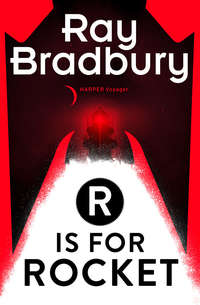
Полная версия
The Toynbee Convector
Shumway stepped back and turned the machine on again. If the old man were to travel, let the machine—symbolically, anyway—go with him. It made a sympathetic humming. The fire of it, the bright sun fire, burned in all of its spider grids and armatures and lighted the cheeks and the vast brow of the ancient traveler, whose head seemed to nod with the vibrations and whose smile, as he traveled into darkness, was the smile of a child much satisfied.
The reporter stood for a long moment more, wiping his cheeks with the backs of his hands. Then, leaving the machine on, he turned, crossed the room, pressed the button for the glass elevator and, while he was waiting, took the time traveler’s tapes and cassettes from his jacket pockets and, one by one, shoved them into the incinerator trash flue set in the wall.
The elevator doors opened, he stepped in, the doors shut. The elevator hummed now, like yet another time device, taking him up into a stunned world, a waiting world, lifting him up into a bright continent, a future land, a wondrous and surviving planet.…
That one man with one lie had created.
Trapdoor
Clara Peck had lived in the old house for some ten years before she made the strange discovery. Halfway upstairs to the second floor, on the landing, in the ceiling—
The trapdoor.
“Well, my God!”
She stopped dead, midstairs, to glare at the surprise, daring it to be true.
“It can’t be! How could I have been so blind? Good grief, there’s an attic in my house!”
She had marched up and downstairs a thousand times on a thousand days and never seen.
“Damned old fool.”
And she almost tripped going down, having forgotten what she had come up for in the first place.
Before lunch, she arrived to stand under the trapdoor again, like a tall, thin, nervous child with pale hair and cheeks, her too bright eyes darting, fixing, staring.
“Now I’ve discovered the damn thing, what do I do with it? Storage room up there, I bet. Well—”
And she went away, vaguely troubled, feeling her mind slipping off out of the sun.
“To hell with that, Clara Peck!” she said, vacuuming the parlor. “You’re only fifty-seven. Not senile, yet, by God!”
But still, why hadn’t she noticed?
It was the quality of silence, that was it. Her roof had never leaked, so no water had ever tapped the ceilings; the high beams had never shifted in any wind, and there were no mice. If the rain had whispered, or the beams groaned, or the mice danced in her attic, she would have glanced up and found the trapdoor.
But the house had stayed silent, and she had stayed blind.
“Bosh!” she cried, at supper. She finished the dishes, read until ten, went to bed early.
It was during that night that she heard the first, faint, Morse-code tapping, the first graffiti-scratching above, behind the blank ceiling’s pale, lunar face.
Half-asleep, her lips whispered: Mouse?
And then it was dawn.
Going downstairs to fix breakfast, she fixed the trapdoor with her steady, small-girl’s stare and felt her skinny fingers twitch to go fetch the stepladder.
“Hell,” she muttered. “Why bother to look at an empty attic? Next week, maybe.”
For about three days after that, the trapdoor vanished.
That is, she forgot to look at it. So it might as well not have been there.
But around midnight on the third night, she heard the mouse sounds or the whatever-they-were sounds drifting across her bedroom ceiling like milkweed ghosts touching the lost surfaces of the moon.
From that odd thought she shifted to tumbleweeds or dandelion seeds or just plain dust shaken from an attic sill.
She thought of sleep, but the thought didn’t take.
Lying flat in her bed, she watched the ceiling so fixedly she felt she could x-ray whatever it was that cavorted behind the plaster.
A flea circus? A tribe of gypsy mice in exodus from a neighbor’s house? Several had been shrouded, recently, to look like dark circus tents, so that pest-killers could toss in killer bombs and run off to let the secret life in the places die.
That secret life had most probably packed its fur luggage and fled. Clara Peck’s boarding house attic, free meals, was their new home away from home.
And yet.…
As she stared, the sounds began again. They shaped themselves in patterns across the wide ceiling’s brow; long fingernails that, scraping, wandered to this corner and that of the shut-away chamber above.
Clara Peck held her breath.
The patterns increased. The soft prowlings began to cluster toward an area above and beyond her bedroom door. It was as if the tiny creatures, whatever they were, were nuzzling another secret door, above, wanting out.
Slowly, Clara Peck sat up in bed, and slowly put her weight to the floor, not wanting it to creak. Slowly she cracked her bedroom door. She peered out into a hall flooded with cold light from a full moon, which poured through the landing window to show her—
The trapdoor.
Now, as if summoned by her warmth, the sounds of the tiny lost ghost feet above rushed to cluster and fret at the trapdoor rim itself.
Christ! thought Clara Peck. They hear me. They want me to—
The trapdoor shuddered gently with the tiny rocking weights of whatever it was arustle there.
And more and more of the invisible spider feet or rodent feet of the blown curls of old and yellowed newspapers touched and rustled the wooden frame.
Louder, and still louder.
Clara was about to cry: Go! Git!
When the phone rang.
“Gah!” gasped Clara Peck.
She felt a ton of blood plunge like a broken weight down her frame to crush her toes.
“Gah!”
She ran to seize, lift and strangle the phone.
“Who!?” she cried.
“Clara! It’s Emma Crowley! What’s wrong?!”
“My God!” shouted Clara. “You scared the hell out of me! Emma, why are you calling this late?”
There was a long silence as the woman across town found her own breath.
“It’s silly, I couldn’t sleep. I had this hunch—”
“Emma—”
“No, let me finish. All of a sudden I thought, Clara’s not well, or Clara’s hurt, or—”
Clara Peck sank to the edge of the bed, the weight of Emma’s voice pulling her down. Eyes shut, she nodded.
“Clara,” said Emma, a thousand miles off, “you—all right?”
“All right,” said Clara, at last.
“Not sick? House ain’t on fire?”
“No, no. No.”
“Thank God. Silly me. Forgive?”
“Forgiven.”
“Well, then … good night.”
And Emma Crowley hung up.
Clara Peck sat looking at the receiver for a full minute, listening to the signal that said that someone had gone away, and then at last placed the phone blindly back in its cradle.
She went back out to look up at the trapdoor.
It was quiet. Only a pattern of leaves, from the window, flickered and tossed on its wooden frame.
Clara blinked at the trapdoor.
“Think you’re smart, don’t you?” she said.
There were no more prowls, dances, murmurs, or mouse-pavanes for the rest of that night.
The sounds returned, three nights later, and they were—larger.
“Not mice,” said Clara Peck. “Good-sized rats. Eh?”
In answer, the ceiling above executed an intricate, crosscurrenting ballet, without music. This toe dancing, of a most peculiar sort, continued until the moon sank. Then, as soon as the light failed, the house grew silent and only Clara Peck took up breathing and life, again.
By the end of the week, the patterns were more geometrical. The sounds echoed in every upstairs room; the sewing room, the old bedroom, and in the library where some former occupant had once turned pages and gazed over a sea of chestnut trees.
On the tenth night, all eyes and no face, with the sounds coming in drumbeats and weird syncopations, at three in the morning, Clara Peck flung her sweaty hand at the telephone to dial Emma Crowley:
“Clara! I knew you’d call!”
“Emma, it’s three a.m. Aren’t you surprised?”
“No, I been lying here thinking of you. I wanted to call, but felt a fool. Something is wrong, yes?”
“Emma, answer me this. If a house has an empty attic for years, and all of a sudden has an attic full of things, how come?”
“I didn’t know you had an attic—”
“Who did? Listen, what started as mice then sounded like rats and now sounds like cats running around up there. What’ll I do?”
“The telephone number of the Ratzaway Pest Team on Main Street is—wait. Here. MAIN seven-seven-nine-nine. You sure something’s in your attic?”
“The whole damned high school track team.”
“Who used to live in your house, Clara?”
“Who—?”
“I mean, it’s been clean all this time, right, and now, well, infested. Anyone ever die there?”
“Die?”
“Sure, if someone died there, maybe you haven’t got mice, at all.”
“You trying to tell me—ghosts?”
“Don’t you believe—?”
“Ghosts, or so-called friends who try spooking me with them. Don’t call again, Emma!”
“But, you called me!”
“Hang up, Emma!!”
Emma Crowley hung up.
In the hall at three fifteen in the cold morning, Clara Peck glided out, stood for a moment, then pointed up at the ceiling, as if to provoke it.
“Ghosts?” she whispered.
The trapdoor’s hinges, lost in the night above, oiled themselves with wind.
Clara Peck turned slowly and went back, and thinking about every movement, got into bed.
She woke at four twenty in the morning because a wind shook the house.
Out in the hall, could it be?
She strained. She tuned her ears.
Very softly, very quietly, the trapdoor in the stairwell ceiling squealed.
And opened wide.
Can’t be! she thought.
The door fell up, in, and down, with a thud.
Is! she thought.
I’ll go make sure, she thought.
No!
She jumped, ran, locked the door, leaped back in bed.
“Hello, Ratzaway!” she heard herself call, muffled, under the covers.
Going downstairs, sleepless, at six in the morning, she kept her eyes straight ahead, so as not to see that dreadful ceiling.
Halfway down she glanced back, started, and laughed.
“Silly!” she cried.
For the trapdoor was not open at all.
It was shut.
“Ratzaway?” she said, into the telephone receiver, at seven thirty on a bright morning.
It was noon when the Ratzaway inspection truck stopped in front of Clara Peck’s house.
In the way that Mr. Timmons, the young inspector, strolled with insolent disdain up the walk, Clara saw that he knew everything in the world about mice, termites, old maids, and odd late-night sounds. Moving, he glanced around at the world with that fine masculine hauteur of the bullfighter midring or the skydiver fresh from the sky, or the womanizer lighting his cigarette, back turned to the poor creature in the bed behind him. As he pressed her doorbell, he was God’s messenger. When Clara opened the door she almost slammed it for the way his eyes peeled away her dress, her flesh, her thoughts. His smile was the alcoholic’s smile. He was drunk on himself. There was only one thing to do:
“Don’t just stand there!” she shouted. “Make yourself useful!” She spun around and marched away from his shocked face.
She glanced back to see if it had had the right effect. Very few women had ever talked this way to him. He was studying the door. Then, curious, he stepped in.
“This way!” said Clara.
She paraded through the hall, up the steps to the landing, where she had placed a metal stepladder. She thrust her hand up, pointing.
“There’s the attic. See if you can make sense out of the damned noises up there. And don’t overcharge me when you’re done. Wipe your feet when you come down. I got to go shopping. Can I trust you not to steal me blind while I’m gone?”
With each blow, she could see him veer off balance. His face flushed. His eyes shone. Before he could speak, she marched back down the steps to shrug on a light coat.
“Do you know what mice sound like in attics?” she said, over her shoulder.
“I damn well do, lady,” he said.
“Clean up your language. You know rats? These could be rats or bigger. What’s bigger in an attic?”
“You got any raccoons around here?” he said.
“How’d they get in?”
“Don’t you know your own house, lady? I—”
But here they both stopped.
For a sound had come from above.
It was a small itch of a sound at first. Then it scratched. Then it gave a thump like a heart.
Something moved in the attic.
Timmons blinked up at the shut trapdoor and snorted.
“Hey!”
Clara Peck nodded, satisfied, pulled on her gloves, adjusted her hat, watching.
“It sounds like—” drawled Mr. Timmons.
“Yes?”
“Did a sea captain ever live in this house?” he asked, at last.
The sound came again, louder. The whole house seemed to drift and whine with the weight which was shifted above.
“Sounds like cargo.” Timmons shut his eyes to listen. “Cargo on a ship, sliding when the ship changes course.” He broke into a laugh and opened his eyes.
“Good God,” said Clara, and tried to imagine that.
“On the other hand,” said Mr. Timmons, half-smiling up at that ceiling, “you got a greenhouse up there, or something? Sounds like plants growing. Or a yeast, may be, big as a doghouse, getting out of hand. I heard of a man once, raised yeast in his cellar. It—”
The front screen door slammed.
Clara Peck, outside glaring in at his jokes, said:
“I’ll be back in an hour. Jump!”
She heard his laughter follow her down the walk as she marched. She hesitated only once to look back.
The damn fool was standing at the foot of the ladder, looking up. Then he shrugged, gave a what-the-hell gesture with his hands, and—
Scrambled up the stepladder like a sailor.
When Clara Peck marched back an hour later, the Ratzaway truck still stood silent at the curb.
“Hell,” she said to it. “Thought he’d be done by now. Strange man tromping around, swearing—”
She stopped and listened to the house.
Silence.
“Odd,” she muttered.
“Mr. Timmons!?” she called.
And realizing she was still twenty feet from the open front door, she approached to call through the screen.
“Anyone home?”
She stepped through the door into a silence like the silence in the old days before the mice had begun to change to rats and the rats had danced themselves into something larger and darker on the upper attic decks. It was a silence that, if you breathed it in, smothered you.
She swayed at the bottom of the flight of stairs, gazing up, her groceries hugged like a dead child in her arms.
“Mr. Timmons—?”
But the entire house was still.
The portable ladder still stood waiting on the landing.
But the trapdoor was shut.
Well, he’s obviously not up in there! she thought. He wouldn’t climb and shut himself in. Damn fool’s just gone away.
She turned to squint out at his truck abandoned in the bright noon’s glare.
Truck’s broke down, I imagine. He’s gone for help.
She dumped her groceries in the kitchen and for the first time in years, not knowing why, lit a cigarette, smoked it, lit another, and made a loud lunch, banging skillets and running the can opener overtime.
The house listened to all this, and made no response.
By two o’clock the silence hung about her like a cloud of floor polish.
“Ratzaway,” she said, as she dialed the phone.
The Pest Team owner arrived half an hour later, by motorcycle, to pick up the abandoned truck. Tipping his cap, he stepped in through the screen door to chat with Clara Peck and look at the empty rooms and weigh the silence.
“No sweat, ma’am,” he said, at last. “Charlie’s been on a few benders, lately. He’ll show up to be fired, tomorrow. What was he doing here?”
With this, he glanced up the stairs at the stepladder.
“Oh,” said Clara Peck, quickly, “he was just looking at—everything.”
“I’ll come, myself, tomorrow,” said the owner.
And as he drove away into the afternoon, Clara Peck slowly moved up the stairs to lift her face toward the ceiling and watch the trapdoor.
“He didn’t see you, either,” she whispered.
Not a beam stirred, not a mouse danced, in the attic.
She stood like a statue, feeling the sunlight shift and lean through the front door.
Why? she wondered. Why did I lie?
Well, for one thing, the trapdoor’s shut, isn’t it?
And, I don’t know why, she thought, but I won’t want anyone going up that ladder, ever again. Isn’t that silly? Isn’t that strange?
She ate dinner early, listening.
She washed the dishes, alert.
She put herself to bed at ten o’clock, but in the old downstairs maid’s room, for long years unused. Why she chose to lie in this downstairs room, she did not know, she simply did it, and lay there with aching ears, and the pulse moving in her neck and in her brow.
Rigid as a tomb carving under the sheet, she waited.
Around midnight, a wind passed, shook a pattern of leaves on her counterpane. Her eyes flicked wide.
The beams of the house trembled.
She lifted her head.
Something whispered ever so softly in the attic.
She sat up.
The sound grew louder, heavier, like a large but shapeless animal, prowling the attic dark.
She placed her feet on the floor and sat looking at them. The noise came again, far up, a scramble like rabbits’ feet here, a thump like a large heart there.
She stepped out into the downstairs hall and stood bathed in a moonlight that was like a pure cool dawn filling the windows.
Holding the banister, she moved stealthily up the stairs. Reaching the landing, she touched the stepladder, then raised her eyes.
She blinked. Her heart jumped, then held still.
For as she watched, very slowly the trapdoor above her sank away. It opened, to show her a waiting square of darkness like a mine shaft going up, without end.
“I’ve had just about enough!” she cried.
She rushed down to the kitchen and came storming back up with hammer and nails, to climb the ladder in furious leaps.
“I don’t believe any of this!” she cried. “No more, do you hear? Stop!”
At the top of the ladder she had to stretch up into the attic, into the solid darkness with one hand and arm. Which meant that her head had to poke halfway through.
“Now!” she said.
At that very instant, as her head shoved through and her fingers fumbled to find the trapdoor, a most startling, swift thing occurred.
As if something had seized her head, as if she were a cork pulled from a bottle, her entire body, her arms, her straight-down legs, were yanked up into the attic.
She vanished like a magician’s handkerchief. Like a marionette whose strings are grabbed by an unseen force, she whistled up.
So swift was the motion that her bedroom slippers were left standing on the stepladder rungs.
After that, there was no gasp, no scream. Just a long breathing silence for about ten seconds.
Then, for no seen reason, the trapdoor slammed flat down shut.
Because of the quality of silence in the old house, the trapdoor was not noticed again.…
Until the new tenants had been in the house for about ten years.
On the Orient, North
It was on the Orient Express heading north from Venice to Paris to Calais that the old woman noticed the ghastly passenger.
He was a traveler obviously dying of some dread disease.
He occupied compartment 22 on the third car back, and had his meals sent in and only at twilight did he rouse to come sit in the dining car surrounded by the false electric lights and the sound of crystal and women’s laughter.
He arrived this night, moving with a terrible slowness to sit across the aisle from this woman of some years, her bosom like a fortress, her brow serene, her eyes with a kindness that had mellowed with time.
There was a black medical bag at her side, and a thermometer tucked in her mannish lapel pocket.
The ghastly man’s paleness caused her left hand to crawl up along her lapel to touch the thermometer.
“Oh, dear,” whispered Miss Minerva Halliday.
The maître d’ was passing. She touched his elbow and nodded across the aisle.
“Pardon, but where is that poor man going?”
“Calais and London, madame. If God is willing.”
And he hurried off.
Minerva Halliday, her appetite gone, stared across at that skeleton made of snow.
The man and the cutlery laid before him seemed one. The knives, forks, and spoons jingled with a silvery cold sound. He listened, fascinated, as if to the sound of his inner soul as the cutlery crept, touched, chimed; a tintinnabulation from another sphere. His hands lay in his lap like lonely pets, and when the train swerved around a long curve his body, mindless, swayed now this way, now that, toppling.
At which moment the train took a greater curve and knocked the silverware, chittering. A woman at a far table, laughing, cried out:
“I don’t believe it!”
To which a man with a louder laugh shouted:
“Nor do I!”
This coincidence caused, in the ghastly passenger, a terrible melting. The doubting laughter had pierced his ears.
He visibly shrank. His eyes hollowed and one could almost imagine a cold vapor gasped from his mouth.
Miss Minerva Halliday, shocked, leaned forward and put out one hand. She heard herself whisper:
“I believe!”
The effect was instantaneous.
The ghastly passenger sat up. Color returned to his white cheeks. His eyes glowed with a rebirth of fire. His head swiveled and he stared across the aisle at this miraculous woman with words that cured.
Blushing furiously, the old nurse with the great warm bosom caught hold, rose, and hurried off.
Not five minutes later, Miss Minerva Halliday heard the maître d’ hurrying along the corridor, tapping on doors, whispering. As he passed her open door, he glanced at her.
“Could it be that you are—”
“No,” she guessed, “not a doctor. But a registered nurse. Is it that old man in the dining car?”
“Yes, yes! Please, madame, this way!”
The ghastly man had been carried back to his own compartment.
Reaching it, Miss Minerva Halliday peered within.
And there the strange man lay strewn, his eyes wilted shut, his mouth a bloodless wound, the only life in him the joggle of his head as the train swerved.
My God, she thought, he’s dead!
Out loud she said, “I’ll call if 1 need you.”
The maître d’ went away.
Miss Minerva Halliday quietly shut the sliding door and turned to examine the dead man—for surely he was dead. And yet.…
But at last she dared to reach out and to touch the wrists in which so much ice-water ran. She pulled back, as if her fingers had been burned by dry ice. Then she leaned forward to whisper into the pale man’s face.
“Listen very carefully. Yes?”
For answer, she thought she heard the coldest throb of a single heartbeat.
She continued. “I do not know how I guess this. I know who you are, and what you are sick of—”









